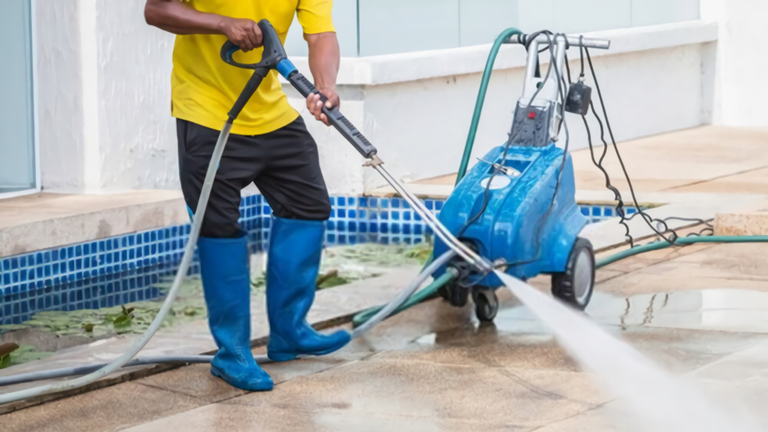If you’re looking for the best pressure washing services, you’ve come to the right place. Chuck Rader is a professional pressure washer with over 30 years of experience. He uses both high and low-pressure water, so you’ll never have to worry about damaging your property. The best way to choose a pressure washer is to read the reviews. You can also read customer testimonials and see what previous customers are saying. Chuck Rader has been pressure washing homes, offices, and commercial buildings for over 30 years.
High-powered pressure washers
Commercial-grade pressure washers typically use three different types of pumps. The axial pump is a direct drive that spins at the same speed as the engine. It delivers good pressure and water power but tends to wear out sooner than the triplex pump. Both types have pros and cons. Pressure washers with more power are better for big cleaning jobs, but you should think about your needs when choosing a model.
Gas-powered pressure washers tend to produce more pressure than electric models. The pressure of a residential gas washer is in the two to three hundred pounds per square inch range, but anything higher than that is probably overkill. Gas-powered pressure washers have higher flow rates and 6,000 to 7,000 cleaning units, making them twice as effective. Compared to electric models, gas-powered pressure washers also tend to clean surfaces twice as fast.
Low-pressure water
If you are in need of a thorough cleaning for your home or business, then low-pressure water pressure washing services may be right for you. Aside from cleaning your house and property, low-pressure water pressure washing can benefit many other things, such as your roof. Low-pressure services, for example, can help to extend the life of your roof by preventing dirt and debris buildup. And, unlike high-pressure water pressure washing, low-pressure services are safe for both your home and your budget.
Before hiring a pressure washing company, it is important to check their reputation and ask for references. While company-selected testimonials are usually trustworthy, you should still follow up on them for any further information. Ask them if they offer a guarantee, which is essential if you are unsure if they’ll be able to deliver the results you expect. And make sure they stand behind their work. Otherwise, you are wasting your money on a service that doesn’t provide guarantees.
Gas-powered pressure washers
There are several advantages to gas-powered pressure washers over their electric counterparts. Gas pressure washers can clean larger surfaces with much less effort and water. These machines also have more power, which allows them to reach more difficult locations, such as the top floors of two-story homes. Even though these machines can be heavy, they are usually easy to move and use because they have wheels and strong steel frames.
High-pressure cleaners can also handle bigger jobs more efficiently. They can get rid of stubborn stains without the need for scrubbing. A gas-powered pressure washer allows a professional to finish a job faster, allowing you to get back to other projects without waiting. It also allows you to finish chores faster. Gas-powered pressure washers are among the best pressure washing services.
Electric pressure washers
While there are many different types of pressure washers on the market, they all have the same basic capabilities. Electric pressure washers use electric motors to boost water pressure. Consequently, they are more affordable and more convenient for non-specialists. The U.S. Consumer Product Safety Commission recently recalled one type of electric pressure washer. But it doesn’t have to be a professional to perform pressure washing services.
While you can use a gas pressure washer for your own home, you should also look into battery-powered options. Some battery-powered units are even more convenient for traveling because they can be easily stored in the trunk of a car. But battery-powered pressure washers are still not a good choice if you don’t want to deal with the limitations of wall outlets and gas engines. You should also consider the “working” pressure when comparing electric pressure washers with gas models. While these pressure washers can perform some of the same jobs, they fall far short of professional-grade water flow.
Pressure washers that use hot water
When looking for a pressure washing service, choose the one with hot water. Hot water pressure washers are more effective than cold water when cleaning tough stains. They typically generate a spray that is 180 degrees Fahrenheit, which is more effective for removing grease and other grime. Hot water pressure washers can also be more expensive and require more maintenance. However, hot water pressure washers are the most effective choice for pressure washing services.
Hot water pressure washers are best for jobs that involve grease, oil, or other heat-reactive substances. The heated water creates a high-pressure abrasive action that loosens and carries stubborn stains away. Hot water pressure washers are best for a variety of cleaning tasks, including removing oil and grease from concrete surfaces. A hot water pressure washer is also better for jobs that require thorough cleaning of garage floors.
Commercial pressure washers
If you’re a professional cleaner who cleans a lot of surfaces, a commercial pressure washer will give you the results you need without the headaches. These machines are powered by an engine and pump, which requires pressurized water. Often, well water doesn’t have the pressure needed to clean hard surfaces properly. Some models won’t work with well water. Check the manual before purchasing a pressure washer to make sure it works with your water supply.
The maximum pressure a pressure washer can produce depends on its PSI. PSI stands for pounds per square inch. A pressure washer with a high PSI is powerful enough to remove even the stickiest gunk. High PSI models range from 2,000 to 3,000 PSI. However, keep in mind that a high PSI rating does not mean that the machine will work better. You should also consider the PSI of the commercial pressure washer.


